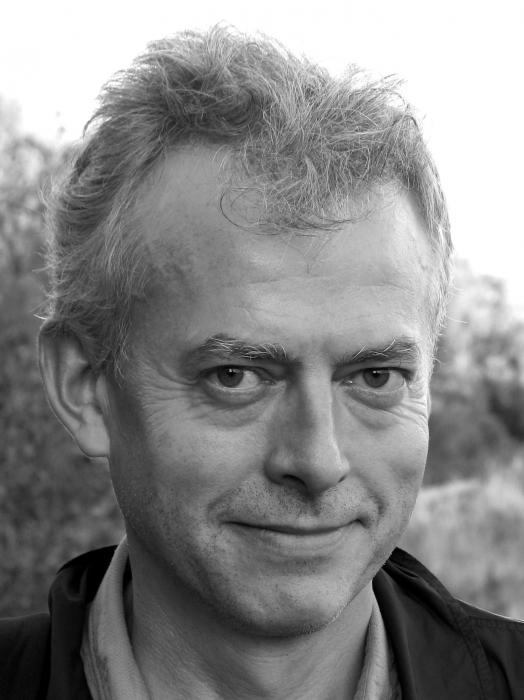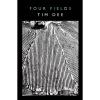Tim Dee
Writer - Non-fiction
Photograph: Claire Spottiswoode
Books
Books
Tim Dee was born in Liverpool in 1961. He has worked as a BBC radio producer for twenty years and divides his life between Bristol and Cambridge. He is the author of THE RUNNING SKY (2009) and FOUR FIELDS (2013).
He is also the editor of GROUND WORK, an anthology of nature writing, which was published by Jonathan Cape in March 2018. LANDFILL, Tim's book on gulls, literature and landfill sites, was published by Little Toller Books in October 2018.
GREENERY: JOURNEYS IN THE SPRINGTIME was published by Jonathan Cape in March 2020.
Praise for GREENERY:
'Masterly... Tim Dee's Greenery, a joyful, poetic hymn to spring, could hardly be less like McCarthy's dystopian novel [The Road], but its impulse is the same. [...] [This] book full of echoes and allusions [is] doubly effective and affecting. For while it celebrates spring... it sets against the cyclical nature of the seasons the linear unspooling of our own lives. [...] Greenery is an education in looking at, and loving, nature. As Dee moves through the world, and the fact of his illness gradually stalks up on him, birds make the strange familiar, the foreign homely. [...] [Love] is what the book leaves you with, a gift to the son Dee may not know for long. It is a lesson in how to love the world, in how to look at it, and behind everything there beats a deeper message: that spring cannot exist without winter, that life needs death to define it.' Alex Preston, Observer 'Science and nature book of the week'
'As the months and latitudes pass, it is clear that Dee's journey is not just terrestrial but a bid "to live so as to avoid winter" - to outpace time itself. What's miraculous about Greenery is that you finish it feeling he's almost succeeded. [...] [The] book is cyclical like the seasons or the movements of the birds that are its lodestars, flitting in time as well as space. [...] Ardent, playful, quietly subversive - this is how Dee has always written, but his originality and learning mean he never needs to resort to the devotional swooning that has always plagued writing about the non-human world. [...] Deeply affecting... like a painter's varnish, deepening shadows but intensifying colours.' William Atkins, Guardian
Praise for LANDFILL:
'It would surely take the staunchest of bird fanciers to stand up for the poor old seagull – or plain gull, as it has become, since it took to the dumps – but that is what Tim Dee does, and does persuasively, in his fascinating, funny and bravely titled Landfill (Little Toller). To say his book is about gulls would be like saying that Lolita is about paedophilia.' John Banville, Guardian 'Books of the Year 2018'
Praise for FOUR FIELDS:
'[Dee] is incapable of writing a dull sentence…very good indeed' Independent
'[Dee's] descriptions are constantly inventive; wry and fearless. A project as expansive, and as mesmerizing, as a fenland sky' Scotsman
'[A] mesmerising book... Written in the same lyrical prose as The Running Sky... Four Fields is about far more than pieces of earth; it is a summary of humanity's aspirations. Tantalinsing and eloquent' Economist
'An enthralling and unexpected book – or four short books – about what we have made of the natural world. The language itself is rich and loamy. There is evidence of much thought here, as well as a naturalist's profound observation. It is proof that really, there is no such thing as "nature writing" – Dee gives us the wide world and everything in it, including ourselves and all our works' Guardian
Praise for THE RUNNING SKY:
'Thrillingly original... Dee's extraordinary, beautifully written account of a life spent watching birds is a fine addition to the flourishing genre of British nature writing' Lynn Barber, Sunday Times
'The Running Sky has the makings of a classic... beautifully written, extraordinarily vigilant, and very moving... we learn a lot about ourselves as well as the fellow creatures flying through, over and around our own lives' Andrew Motion
'Serious and playful... creates a powerful and intensely poetic paean to what others have called the wonder of birds' Guardian
'A little masterpiece, like an intricate skein of all the avian life he has seen, a gorgeously overpopulated love letter to birds' Independent
'[Dee] has a forensic eye for detail and a gift for poetry... He is in the front rank of contributors to the literature of natural history' Daily Telegraph
'As unexpected as it is brilliant... A moving, powerful meditation on the natural world that envelops us' Helen Dunmore
'A most extraordinary, mind-changing odyssey, a 2001 bird obelisk into our muddled perceptions... hugely original and confident and brave' Richard Mabey
'A beautifully haunting and involving memoir. The writer's passion for birds becomes his whole way of expressing his relationship to landscape and history and family: unsentimental and urgently contemporary' Tessa Hadley
'What makes [Dee's] book wonderful is his passion... He captures the thrill and puzzlement of watching birds as I have never previously seen it captured' Sunday Herald
'To write a book about a year's birdwatching as keenly observed as this, you have to be dedicated to the point of obsession; to write one as transcendent, you must be a poet' The Times
'Lyrical... a touchingly human document' Daily Express
'[Dee has] created a marvel. A new species of nature writing and autobiography. He makes you see how populated the sky is, and how busy the air. And his prose flies - soars' Susannah Clapp
Non-Fiction
| Publication Details | Notes |
|---|---|
2020 Jonathan Cape | A masterpiece of nature writing from the author of The Running Sky. Greenery begins in a midsummer in the middle of a winter. One December, in midsummer South Africa, Tim Dee watched swallows and those birds set him off on a journey in pursuit of the spring as it moves north, bringing swallows and all the other spring migrant birds out of Africa and into Europe. Spring moves north across the Europe from the Mediterranean to the Arctic Ocean at roughly fifty kilometres a day between the winter and the summer solstice. We could call that four kilometres an hour for twelve hours each day. Spring, therefore, moves north at about walking pace. Greenery follows swallows and other favoured birds out of Africa from their wintering quarters in South Africa, through their staging places in Chad and Ethiopia, across the colossal and incomprehensible Sahara, and on into Europe. It tries to keep company with the birds and with other animals including some people for whom spring has been the determining season. We hear from a Sámi reindeer herder, a swallow-devotee, an Egyptian taxi-driver, a chronobiologist in arctic Norway. We read of the spring-seeking D. H. Lawrence and of the poet Samuel Taylor Coleridge. Migrant storks join the swallows and venture the Straits of Gibraltar. Migrant honey buzzards dodge Sicilian hunters and the lava wastes of Mount Etna. A wait in a hide for a bear that does not come allows a vision of how nature goes when we are not there to crowd it out. On the other side of the European continent, the curious North Sea island of Heligoland is a haven for sea-going landbirds on their tricky northbound journeys. There are bears, there are boars, there are reindeer, there are camels, there are elephants, there are ostriches… A diary of the spring’s arrival and passage through Britain interleaves the continental greening. Greenery ends where the greenery of the European spring ends: on the shores of the Arctic Ocean in northern Scandinavia, where, yes, there are swallows in midsummer as there were in Cape Town in December. |
2018 Little Toller | In LANDFILL, Tim Dee argues that rubbish tips sustain life and offer an alternative view of how we should treat any species who dares to live so closely among humans. About the book, Tim Dee says: 'I have been a lifelong birdwatcher but more recently I have found myself spending time watching people watching birds. Gulls in Britain are no longer seagulls and I've been fascinated in the last decade by the various ways that these birds have come ashore and come closer to us. In some ways they seem to have become more like us than any other bird. We might now evolve together.' |
2018 Jonathan Cape | A timely collection of the best British nature writing newly commissioned by one of the great authorities on the subject. We are living in the anthropocene – an epoch where everything is being determined by the activities of just one soft-skinned, warm-blooded, short-lived, pedestrian species. How best to live in the ruins that we have made? This anthology of commissioned work tries to answer this as it explores new and enduring cultural landscapes, in a celebration of local distinctiveness that includes new work from some of our finest writers. We have memories of childhood homes from Adam Thorpe, Marina Warner and Sean O’Brien; we journey with John Burnside to the Arizona desert with Tim Ingold to the Canadian Arctic; going from Tessa Hadley’s hymn to her London garden to caving in the Mendips with Sean Borodale to shell-collecting on a Suffolk beach with Julia Blackburn. Helen Macdonald, in her remarkable piece on growing up in a 50-acre walled estate, reflects on our failed stewardship of the planet: ‘I take stock.’ she says, ‘During this sixth extinction, we who may not have time to do anything else must write now what we can, to take stock.’ This is an important, necessary book. |
2013 Jonathan Cape | In his first book since the acclaimed The Running Sky, Tim Dee tells the story of four green fields. Four fields spread around the world: their grasses, their hedges, their birds, their skies, and their natural and human histories. Four real fields - walkable, mappable, man-made, mowable and knowable, but also secretive, mysterious, wild, contested and changing. Four fields - the oldest and simplest and truest measure of what a man needs in life - looked at, thought about, worked in, lived with, written. Dee's four fields, which he has known for more than twenty years, are the fen field at the bottom of his Cambridgeshire garden, a field in southern Zambia, a prairie field in Little Bighorn, Montana, USA, and a grass meadow in the exclusion zone at Chernobyl, Ukraine. Meditating on these four fields, Dee makes us look anew at where we live and how. He argues that we must attend to what we have made of the wild, to look at and think about the way we have messed things up but also to notice how we have kept going alongside nature, to listen to the conversation we have had with grass and fields. Four Fields is a profound, lyrical book by one of Britain's very best writers about nature. |
2009 Jonathan Cape | The Running Sky records a lifetime of looking at birds. Beginning in summer with clouds of breeding seabirds in Shetland and ending with crepuscular nightjars like giant moths in the heart of England, Tim Dee maps his own observations and encounters over four decades of tracking birds across the globe. He tells of near-global birds like sparrows, starlings and ravens, and exotic species, like electrically coloured hummingbirds in California and bee-eaters and broadbills in Africa. In doing so he brilliantly restores us to the primacy of looking, the thrill of watching, and takes us outside, again and again, to stand - with or without binoculars - under the storm of life over our heads, and to marvel once more at what is flying about us. |




